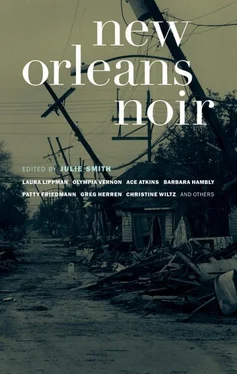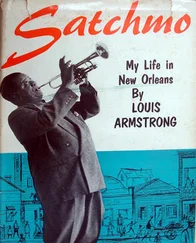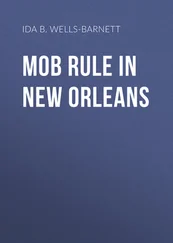“Brandy-brandy, if you’ve got it.”
Williams fished in a broken goods box under the bed. “You want Lemercier or Saint-Valbert?”
Stifling the urge to inquire how bottles of France’s finest had wound up in the back room of a New Orleans bucket shop, January asked instead, “What happened here?” as he took the bottle and gently began to clean the wounds with its contents. “And how do you know the thief was trying to steal your uncle’s Bible? What happened to the thief, by the way?”
“Absquatulated, the pusillanimous fuckard.” Williams perched back on the bed at his side and took a thoughtful swig of the Lemercier. “Lit out of here like I’d stuck a burnin’ fuse up his arse. I marked him good, though. And I know he was tryin’ to steal my Bible ’cause he come in here an’ tried to buy it yesterday afternoon.”
“Buy it?”
“Yeah. I thought it was queer.” She took the cigar from her mouth and blew a thoughtful cloud, lashless blue eyes narrowing in their tangle of lines and crusted paint. January would have guessed the saloonkeeper’s age at forty or so — his own — had he not known how quickly the harsh life of the riverfront dives aged a woman: She was probably a decade younger than she looked, and unlikely to live a decade longer.
“This po’-faced jasper comes in here yesterday afternoon, just as I got the doors open. Asks for rum an’ stands here sippin’ at it — who wants to taste it, fer God’s sake?” She took another gulp of the Lemercier, and passed it back to January to daub on the long knife rake that slashed across Delly’s right pectoral and down the side of her breast. Delly herself lay listening, jaw gritted hard, her eyeballs drifting now and then from the opium. January guessed she wasn’t used to it, from the way one swallow seemed to have dulled the pain.
On the other hand, of course, Hannibal’s favored brand was quadruple-strength Black Drop that would knock out a horse.
Now Delly whispered, “You said he was a ringer, ma’am.”
“That I did, honey.” Williams squeezed the girl’s hand again. “That I did. He was dressed rough, like most of the hard cases that come in here — plug hat, Conestoga boots — but he wore it like he didn’t want to touch the insides of his clothes with his body. His hands was clean, too. You could tell he hadn’t never done hard work with ’em, not like hau-lin’ on a line or pole-walkin’ a boat up a bayou. His hair, too, clean an’ cut short, an’ he had one of them sissy little beards, just around his mouth. Well, he coulda been a gambler, an’ it wasn’t none of my laundry to wash.” She shrugged. “But then he starts an argument with the next man who comes in — Snag-Face Rawlin, that was — pushin’ on about some-thin’ in the Bible, like who was the first King of Israel or somethin’ like that. Next thing I know, he asks me, do I have a Bible to settle the question? Snag-Face is sayin’, Oh, hell, what’s it matter? But this stranger just won’t quit, an’ wants to settle the question—”
“Herod,” whispered Delly through teeth clenched against the pain, as January quickly cleaned out the wound on her chest with the hot herbal wash Hannibal brought in. “Was Herod the first king of Israel?”
“That was it. He pushed a bet onto Snag-Face — fifty cents Herod was. And when I guess Herod wasn’t, he said all damn an’ blast, an’ would I sell him the Bible so’s he wouldn’t make that kind of fool mistake again? I said no, it was my uncle’s Bible. He offered me five dollars for it, and when I said no, he offered me ten.”
January’s eyebrows shot up. Cheaply printed evangelical Bibles could be purchased for twenty-five cents, new.
Williams ground out her cigar under her heel. “So I figured, when my door creaks open in the dead of night an’ some plug-ugly with a handkerchief tied over his face holds a gun on me an’ says, Gimme the Bible , I’m guessin’ it was the same po’-faced bastard with the sissy beard.”
January finished tying off the stitches and took from his satchel clean rags for a bandage. “I think I’d like a look at this Bible.”
“There,” said January, and flipped the pages at random in four or five places till he found what he sought.
Hannibal leaned around his shoulder and read: And the greater house he cieled with fir tree, which he overlaid with fine gold... He glanced at January inquiringly.
“Not at the words. Under them.”
Hannibal leaned close to the page, squinting in the strong morning sunlight. They’d carried the book out to the porch and rested it on the rail. Around them, in sheds and shanties and tents, the Swamp was waking up, as usual with a hangover. “Are those pencil dots?” asked Hannibal after a moment. “Under each letter?”
“Not just pencil dots.” January took a magnifying lens from his instrument case and held it above the page. “That page has been marked two or three times — sometimes in pencil, once with a pin. Look back in Genesis, you’ll see some of the pages have been marked that way four and six times, sometimes for as much as a dozen lines down the column. Always starting at the top of the page...”
Hannibal’s mobile eyebrows shot up in enlightenment. “Someone was using it for a book code.”
“That’s right. And instead of doing the sensible thing one would do with a Bible — citing book, chapter, verse, and then letter-count — our code-makers simply treated it as an ordinary book, starting at the top of the page: 101st letter, or whatever it was. Which meant that both the sender and the receiver had to have the same edition of the Bible, which would have been easy if they’d originally bought them together in the same shop in Philadelphia. What did you say your uncle’s name was, Mrs. Williams?”
“Walter.” The proprietress scratched under one uncorseted breast. “Walter Buling. My daddy had a farm below Natchez. Uncle Walter came there in 1825, sick as a horse with the consumption. That’s where he died.”
“Walter Buling.” January nodded slowly, and turned to the back of the book. Where pages are sometimes inserted to make up odd-numbered signatures, only a single, ragged, yellowed edge remained. “When I was eleven years old,” he said, “in 1806, New Orleans was clapped under martial law for a number of weeks by the governor of the Louisiana Territory, a gentleman named Major-General James Wilkinson.”
“Wilkinson!” exclaimed Williams. “Gentleman my arse — wasn’t he the skunk who swindled all them folks out of Texas land grants about ten years ago?”
“He was indeed,” January replied. “He’d earlier been twice court-martialed for botching invasions of Canada and Spanish Florida during the war with England in 1812, and died in disgrace in Mexico shortly after the Texas debacle. But in 1806, while governor of the Territory, he teamed up with former Vice President Aaron Burr, allegedly to conquer Mexico, to separate the Southern states from the North, to loot all the banks in New Orleans in the confusion, and to form an empire that Burr would then rule from New Orleans, presumably with the help of Wilkinson’s American troops.
“Now, my mother still swears that Wilkinson was playing a double game and taking money from the Spanish viceroy of Mexico — then as now, she knew everyone in town. In any case, Wilkinson sold Burr out, testified against him in court, and was protected by Thomas Jefferson for the rest of his life as a result. Who was paying whom how much back in 1806 I have no idea, but I do remember that Walter Buling of Natchez was one of Wilkinson’s lieutenants.”
“So you think Buling lifted some money in the confusion?” Hannibal thumbed the onion-skin pages, peering through the glass at the lines of pinpricks and dots, the occasional notes in the margin: e-45, t-67, a-103 ... “Either a Spanish payoff or from one of the New Orleans banks...?”
Читать дальше












